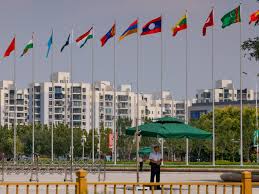Protocol Controversy at the Shanghai Summit: Between Religious and Diplomatic Considerations

The clip, shared by Chinese accounts and described as "unusual," quickly spread on social media, with reactions varying between those who viewed the act as a diplomatic insult and those who defended it as a commitment to Islamic religious teachings that prohibit Muslim women from shaking hands with foreign men.
On one hand, some commentators believed that such actions could weaken international relations based on mutual respect and clear diplomatic symbols. Others pointed out the necessity of considering cultural and religious backgrounds in international meetings, especially since Aziza Ismail was not the only one adhering to this stance, as many Islamic figures are known for it.
However, it is noteworthy that the Malaysian president himself shook hands with the Chinese president's wife, raising questions about the lack of prior coordination through diplomatic channels to avoid any embarrassment.
In response to the controversy, Aziza Ismail posted a tweet on her account on the "X" platform praising the reception held by the Chinese president's wife, emphasizing the importance of participation in enhancing cooperation between countries. She also referred to her positive meetings with the wives of leaders from other countries such as Turkey, Iran, and Egypt.
In a related context, another video circulated showing the Chinese president ignoring a handshake with Indian Prime Minister Narendra Modi, which sparked a new wave of criticism. However, verification of the video revealed that it was misleading and belonged to a previous summit, and that the meeting between the two leaders occurred normally according to diplomatic protocols.
These incidents highlight the importance of prior coordination through diplomatic channels to agree on appropriate protocols and to consider cultural and religious backgrounds in international meetings, as well as verifying the accuracy of materials circulated on social media before publishing them and distinguishing between personal actions and official political stances.
Diplomacy remains an art of balancing respect for cultural privacy and adherence to international protocols, a formula that requires wisdom and flexibility from all parties.